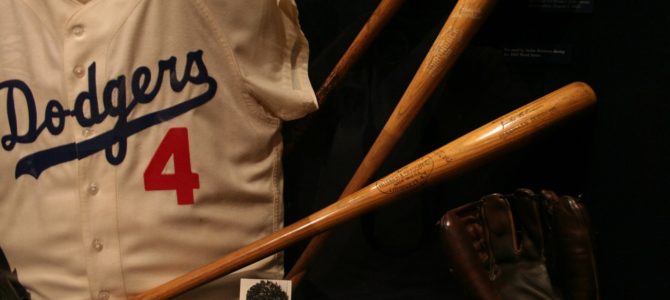
If you’re looking for the foundational myth of the mindset of America’s most popular socialist, The New York Times is ready with an answer. Yes, Sen. Bernie Sanders’ mother’s illness and family’s troubles paying her medical bills played a role in shaping his left-wing politics (as well as providing a familiar echo for those who remember Barack Obama’s largely fictional justification for his health-care scheme). But the episode that truly fueled his rage against capitalism was the same one that broke millions of other hearts in his native Brooklyn.
When the Brooklyn Dodgers left New York for Los Angeles after the 1957 season, it created a grudge that Sanders — and countless other Dodger fans of a certain age — has never entirely let go of. As he recently told the Times: “It was like they would move the Brooklyn Bridge to California. How can you move the Brooklyn Bridge to California?”
For a person who has been largely reluctant to open up about the major influences on his life, what happened to the Dodgers is one thing about which he is always willing to talk. “I don’t want to tell you that was the sole reason that I’ve developed the politics that I’ve developed. But as a kid, I did see in that case about the greed of one particular company. And that impacted me.”
Bernie’s account of what happened to the Dodgers reflects a view of that chapter of baseball and New York history that was almost universally held to be true by Brooklynites of his generation. Most would agree with writers Jack Newfield and Pete Hamill, who declared Dodgers owner Walter O’Malley deserved a place on a list of the “worst human beings of the 20th century” along with Adolf Hitler and Joseph Stalin because he had “killed a generation’s innocence” by absconding with Brooklyn’s team to Los Angeles.
But in recent decades, the myth of O’Malley’s greed has been largely exploded. An examination of this story stripped of the old narrative tells us more about how big government and unaccountable bureaucrats can destroy a city than the simple tale of a team owner’s desire for greater wealth that Sanders still believes.
The City Planner Whose Power Went to His Head
The unraveling of the fable about O’Malley’s perfidy began with the publication of Robert Caro’s “Power Broker,” the epic biography of Robert Moses. In it, Caro noted, that Moses, whose position as New York City’s planning czar gave him unlimited power to stop any development, had prevented the Dodgers from building a new stadium in Brooklyn. Subsequent studies of Moses’ role in foiling O’Malley’s plans for a domed stadium to be built at the intersection of Atlantic and Flatbush Avenues in downtown Brooklyn have come from historians Neil Sullivan and Michael Shapiro.
Ebbets Field, the Dodgers’ home from 1913 to 1957, has taken on the nostalgic aspect of a baseball Camelot. Some associate it with a golden age of New York baseball in which the Brooklyn team dominated along with their National League rival, the New York Giants, and their American League nemesis, the New York Yankees. But a hard look at the economics of baseball in that era shows that both the Dodgers and the Giants, who ultimately joined them on the West coast by moving to San Francisco, were in trouble.
Unlike the Giants, who were a financial basket case while playing in the decaying Polo Grounds, the Dodgers were still profitable. But despite fielding a team filled with future Hall of Famers including Jackie Robinson, Major League Baseball’s first African-American player, attendance at Dodger games had been declining. Dodger attendance had reached an all-time high in Robinson’s first year in 1947, with approximately 1.8 million fans filing into Ebbets Field. But by 1957, that number was down to just over the 1 million mark.
O’Malley can hardly be blamed for seeking to replace a crumbling stadium in a neighborhood — Flatbush — that was in steep decline. Unless the Dodgers found a new home, the team was on its way to becoming a losing proposition.
Yet his first choice was not to move to LA, where the team would thrive in the following decades. O’Malley’s plan was to build the country’s first domed stadium (several years before Houston’s Astrodome was erected) at the site that is the junction for most of the New York’s subway lines. Some 50 years later, the Barclay’s Center, an indoor arena where the National Basketball Association’s Brooklyn Nets play basketball, would be built there.
But Moses’ veto prevented O’Malley from keeping the team in Brooklyn.
An Unelected Bureaucrat with Dictatorial Power
Moses’ untrammeled grip on New York in that era is hard to fathom even in retrospect. Although never elected to any public office, starting in the 1930s he gradually accumulated sole authority to control major governmental building projects via posts at the head of the Port Authority, the Triborough Bridge and Tunnel Authority, and the New York City Parks Department. What’s more, he was not accountable to any elected politician or legislature, making him far more powerful than the city’s mayor or the state’s governor.
That enabled Moses to build the highways, bridges, and tunnels as well as the parks and institutions that are emblematic of 20th century New York City, including sites like the Lincoln Center for the Performing Arts. It also gave him the ability to level neighborhoods, displacing hundreds of thousands of residents to dismal public housing projects, and, in the view of many urban historians, laying waste to large sections of the city.
O’Malley intended to pay for his new ballpark. But he needed the city’s permission as well as its agreement to accommodate it with improved infrastructure (as a later generation of city planners agreed to do when the New York Yankees and the New York Mets built new stadiums that opened in 2009). In the 1950s that meant getting the okay from one man — Moses.
But Moses had little interest in sports and even less understanding of the Dodgers’ importance in keeping afloat a decaying borough like Brooklyn. He was ready to let O’Malley build a stadium in Queens — where eventually the New York Mets would erect Shea Stadium and later Citi Field — on less than favorable terms. But he was opposed to keeping the Dodgers in Brooklyn.
Stymied by Moses from pursuing his ambitious dream and seeing little benefit to his team in losing its connection to its home borough without the advantage of opening up a vast new and profitable market, O’Malley enriched his stockholders by taking a better offer from Los Angeles. That made him a hero to Southern Californians but a villain to New Yorkers.
The Fault for the Dodgers’ Move Is Shared
The fault was not Moses’ alone. New York’s politicians did nothing to pressure Moses to relent and were not subsequently punished for their inaction by the voters. And Brooklyn fans like Sanders, who have in the years since 1957 embraced an identity as a tribe of martyrs to O’Malley’s avarice, also need to take responsibility for their role in the debacle. Had they been willing to fill Ebbets Field regularly rather than leaving it half empty when one of sports’ most iconic teams played there, then the Dodgers might have been more inclined to stay.
Moses operated in an era in which the New Deal had made centralized planning respectable. He had his triumphs, but the cost of his dictatorial power in terms of the urban blight he spread may have outweighed any of the good he did.
One may argue that a ballclub that is an essential part of a city’s identity, such as the Dodgers were to Brooklyn, is a public trust as well as a private enterprise. But what happened to the Dodgers was the inevitable result of making government so powerful that it can pick winners or losers in the private sector as well as to make determinations about development that have little to do with the interests or the opinions of the public.
Those, like Sanders, who still see what happened in 1957 as only a case of corporate greed, ignore the fact that main reason Brooklyn lost the Dodgers was the unaccountable governmental authority Moses presided over. But that’s a story that debunks a belief in big government rather than inspiring it.









